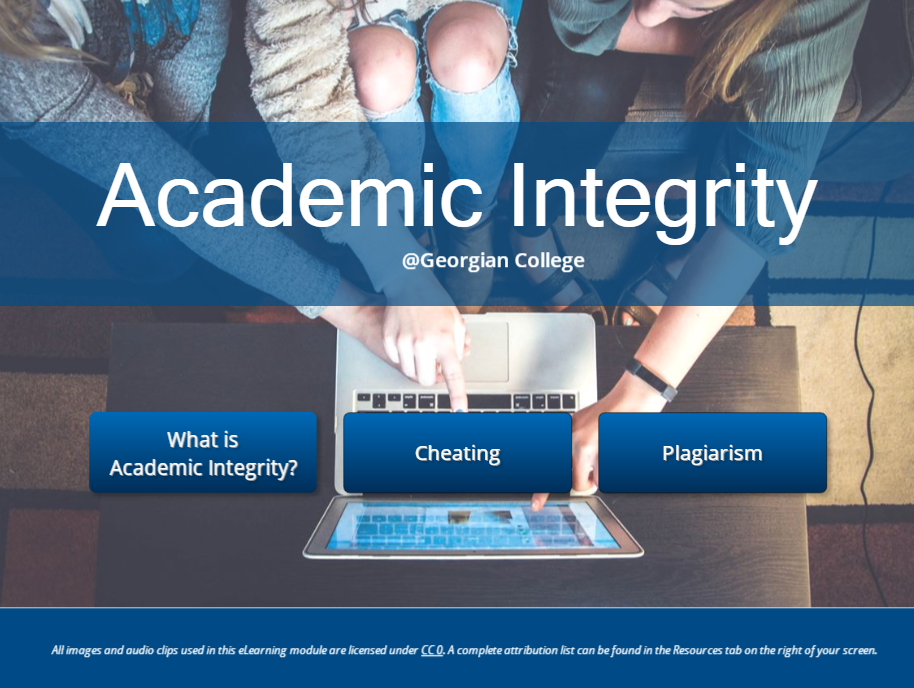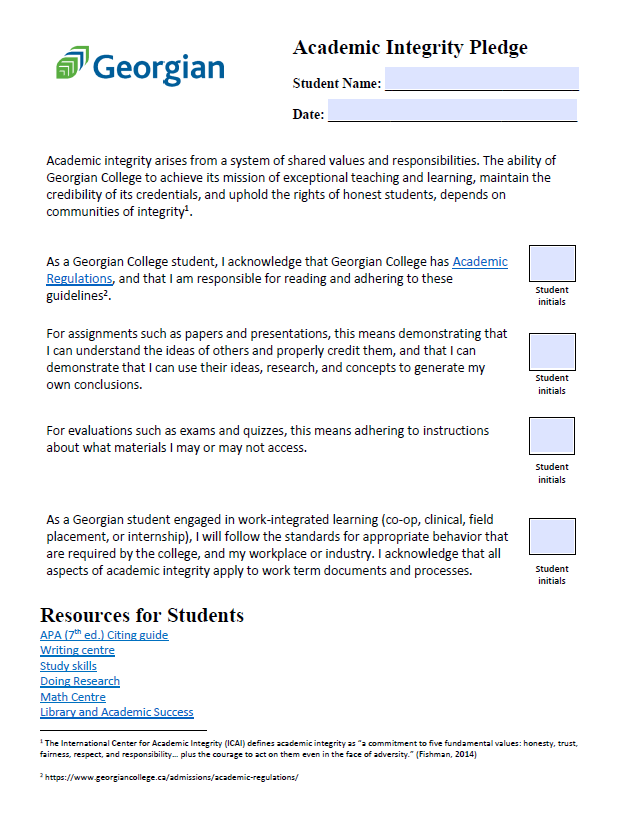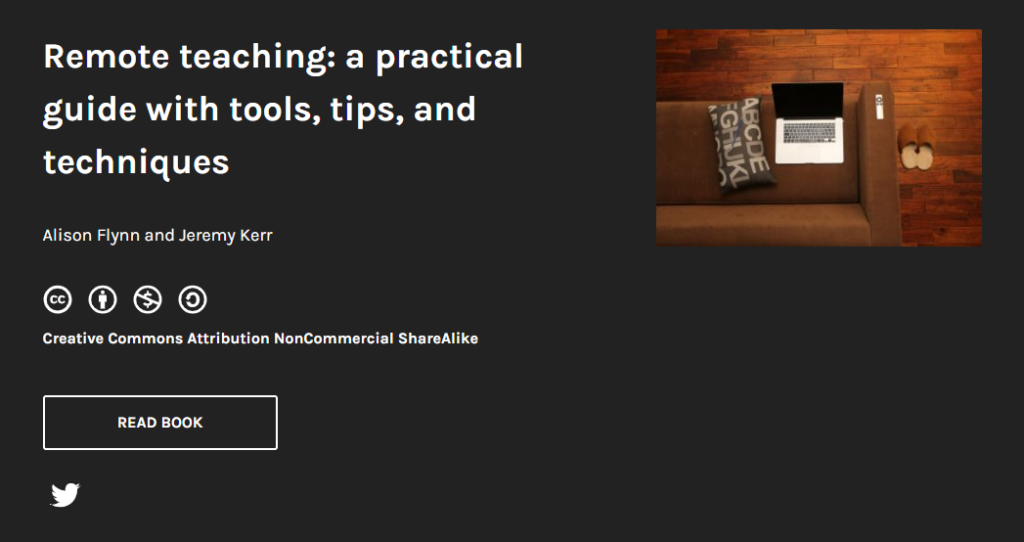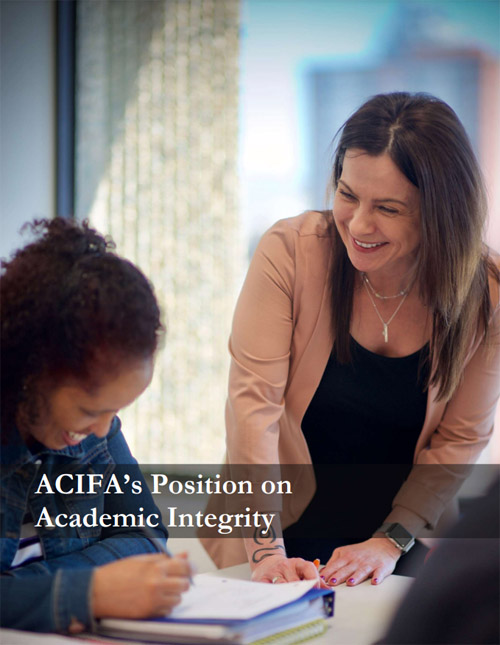
Academic integrity
The International Centre for Academic Integrity defines integrity as a commitment to six fundamental values: honesty, trust, fairness, respect, responsibility and courage. The resources on this page are intended to promote academic integrity at Georgian by providing faculty with ideas and tips for creating a climate of academic integrity and preventing cheating and plagiarism.
To review Georgian’s current policies and procedures regarding academic misconduct, please visit the Academic Regulations website.
On this page:
- Guiding principles for AI
- Creating a culture of academic integrity
- Helping students understand academic integrity
- Academic Integrity Module
- Consider a syllabus statement
- Honour pledges in the classroom
- Assessment and academic integrity
- Scenario-based learning for academic integrity
- Artificial intelligence-assisted work
- Contract cheating
- Professional development opportunities
- Podcasts and additional resources
- References
Guiding principles for AI
Georgian’s evolving approach to interactions with artificial intelligence
The story of artificial intelligence (AI) and our approach at Georgian College is continuously unfolding. The success of our students, alumni and communities is the central value of our institution, and we continue to adapt to meet the demands of a changing world.
The introduction of AI, machine learning and natural language processing has inspired our institution to develop guidelines on using AI ethically, fairly, responsibly and intentionally in our work. These guidelines reflect our current strategic and academic priorities and commitments. As we prepare our community members (students, faculty and staff) for current and future AI interactions, these principles will help us navigate AI’s ethical, social, and cultural implications and opportunities.

Georgian College embraces these approaches for working with AI. We will:
- Leverage AI applications that empower people, eliminate barriers to equity, protect and preserve our land and waters, and lead to positive social change.
- Support students, faculty, and staff in responsibly and ethically embracing AI as a tool that enriches teaching and learning and opportunities to collaborate, contribute and grow.
- Recognize that AI informs our work in multiple ways; therefore, forward-thinking, contextually relevant, and flexible approaches to its use are critical.
- Encourage the use of AI to overcome traditional interdisciplinary barriers and promote cross-community collaboration.
- Trust that all community members will communicate transparently and clearly when using AI in all contexts.
- Model positive usage of AI and shift the narrative to using an ethical and integrity-based lens.
- Commit to growing Georgian’s support ecosystem through collaboration in developing evidence-informed resources built upon the fundamental values of academic integrity: honesty, trust, fairness, respect, responsibility and courage.
- Prepare our students to confidently co-create and contribute to a future which includes an ever-evolving need for AI fluency.
- Continue to respond, engage, innovate and share our stories as AI in education and industry evolves.
Creating a culture of academic integrity
Start the academic integrity discussions early in your course and scaffold the conversation throughout the semester. Just like any learning, the discussion needs to be revisited, decontextualized and reimaged in different ways to help students to understand.
- Discuss with students during orientation the importance of integrity and what that looks like in your classroom
- Have students complete the Academic Integrity module and consider linking an assignment or reflection to its completion
- Include an academic integrity pledge statement in your syllabus and in Blackboard that students are required to sign
- Hold virtual hours so students can connect with you one on one

Building relationships with students not only helps to improve engagement and minimize cheating. It also helps to detect cheating when it occurs. Research shows that if a student feels disconnected or dissatisfied with the learning experience or their program, their relationship with other students or the teacher, they are more likely to cheat.
Robinson and Glanzer (2017) noted that dissatisfaction in the learning environment may occur if students perceive faculty as the “integrity police” (p.212). Students value a holistic approach to their studies and to academic integrity (Robinson and Glanzer, 2017). Additionally, faculty enthusiasm for the content and to the learning environment can help build trust and promote integrity (Orosz et.al, 2015).
- Consider an asked and answered section in blackboard. This can help students know what questions other students have had and minimize repeating the same answers to individuals.
- Act as a role model. Take the time to cite your own sources properly when providing course handouts and PowerPoint presentations. Consider a universal design for learning (UDL) approach to learning. Students learn in a variety of different ways, so consider the multiple means of representation you can provide.
Helping students understand academic integrity
Lack of knowledge
Talk to students about cheating and plagiarism and your expectations for ethical behaviour. Research shows that students cheat and plagiarize for the following reasons:
- They didn’t realize they were breaking the rules.
- Discuss academic integrity and your expectations at the start of the course and weave it throughout the semester, focusing on those busy assessment times like mid-semester or the end of the semester.
- They felt there were opportunities to cheat.
- Review your assessments. Can students Google the answers, or do your assessments require students to apply knowledge and understanding? Are your assessments authentic?

“A memo to students on cheating“ – Faculty Focus
- They experienced a pressure to do well from a variety of sources like family or from a competitive desire to achieve a co-op.
- Consider the integrated course design model. Have you provided students opportunity to practise and fail as well as opportunities to be successful?
- They felt the teacher does not care and everyone else is getting away with it.
- Ensure you follow through with academic misconducts. Provide examples of what integrity looks like and what breaches look like and what the consequences are. Link to the college policies.
Review some ideas to talk to students about what cheating is and help them understand the consequences.
Time management
Your syllabus contains information about due dates for the various evaluations over the semester however time management continues to be a reason students feel pressured to make poor decisions around breaches of academic integrity. Telling them when things are due is not enough.
- Talk to students and post resources that may help them to complete assignments. The Georgian College Library offers excellent resources to support students and their study skills like semester planners, weekly planners and reading planners.
- Provide links to the various resources like the Writing Centre, Math Centre, Tutoring, or Research help.
- Build in checkpoints for assignments. Talk about assignment in your classes. Offer separate times for students to meet virtually with you, in groups, or individually to talk about the assignments.
- Break assignments into smaller pieces so they build to a larger assignment. This can help students stay on task and avoid the pressure to purchase an assignment.
Adapted from Humber College Teaching and Learning – CC BY-NC-SA

Academic Integrity Module
At Georgian College, we strive to provide students with opportunities to meet their academic, career, and personal goals. Integrity in and outside the classroom is critical to this, and the Academic Integrity Module (AIM) is designed to help our students navigate its complexities.
The AIM experience consists of a Welcome Module and four (4) additional modules on academic integrity – Living With Integrity, Making Choices, Path to Success, and That’s A Wrap! Branching scenarios, videos, exercises, and Check Your Knowledge quizzes are embedded throughout, and we encourage our students to work through all the materials. Sequential module access is only granted once a student has worked through the content in the previous module and has correctly submitted a quiz, scoring 80%. There are unlimited attempts on each quiz.
Students can start, stop, and return to the module whenever needed. This course should take less than one hour to complete.
You will find the Academic Integrity Module on Blackboard in your list of Current Courses.
Faculty frequently asked questions (FAQs)
The AIM was updated in August 2024. The course focuses on the concept of integrity and making good choices. The module includes information about copyright information and academic integrity.
All semester one students are required to complete the module. The Academic Integrity Module (AIM) will automatically appear as a separate course on the Blackboard Courses screen for all students. Faculty are not required to take any additional steps. Faculty, co-ordinators and administrators will be able to track completions by pulling reports.
Ideally, the module should be completed in the first two weeks of classes to support student understanding about the topic of academic integrity, academic regulations and expectations at Georgian College.
Faculty and administrators can track student completions of the AIM through the AIM Blackboard report.
If you have any further questions or concerns about the AIM modules, please email facultybbsupport@georgiancollege.ca.
For students:
For faculty:
Consider a syllabus statement
Academic integrity is a core value at Georgian College and a priority in all academic activities. Students are responsible for being aware of and demonstrating behaviour that is honest and ethical. Students are also expected to take responsibility for their own academic work, adhering to integrity standards for themselves and their program but also encouraging and cultivating a culture of integrity among their classmates.
Sample syllabus statement:
In circumstances where there is a concern about a breach of academic integrity, faculty may request an initial meeting to discuss these concerns with the student.

Honour pledges in the classroom
Introducing the idea of an honour code or honour pledge helps students to understand and make a commitment to academic integrity. This can support your discussion around the rules and procedures around citing sources and not engaging in practices of dishonesty. If the students co-develop the pledge, it can also create a sense of community and support students to have conversations between their classmates about academic integrity.
Engage your class in a discussion about the purposes and values of education. Start with an open question like:
- What is Integrity and why is integrity important?
- What values do you think Georgian College should uphold to achieve academic integrity?
Develop a shared list of values using a collaborative document like Microsoft Word or Poll Everywhere. This list will vary according to what comes up in discussion. However, some examples include:
- education
- fairness
- scholarship
- citizenship
You might encourage discussion of how these values translate into the program or workplace.
Connect those values with the practices of academic honesty. You can use the Academic Integrity module to connect the values of education and fairness as follows:
- Education: Cheating threatens education because students who cheat do not participate in the experiences which lead to intellectual growth. Also, those who choose to cheat in school are more likely to cheat in the workplace.
- Fairness: As part of the educational process, students receive grades for the work of the course. It’s important that students be judged fairly—not only in reference to other students but also in terms that reflect their real abilities and skills. Employers want to know students are competent.
For more ideas and resources about academic integrity pledges, visit The University of British Columbia website.
Assessment and academic integrity
Chapter seven in the ebook “Remote teaching: a practical guide with tools, tips, and techniques” contains some valuable information about remote teaching, assessment and how to deal with academic integrity issues.
*Remote teaching: a practical guide with tools, tips, and techniques is licensed under a Creative Commons Attribution-Non-Commercial-ShareAlike 4.0 International License, except where otherwise noted.
Scenario-based learning for academic integrity
It is a common and effective practice to contextualize academic integrity for students using clear and relevant cases that bring home the relevance and applicability of these principles in and beyond the classroom.
Choose scenarios that deal with the types of misconduct errors that are most concerning or relevant to the assessments in your course.
Better cases for lively discussion will:
- include acknowledgement of the pressures students can be under when they make bad decisions; and/or
- be open to interpretation to some degree, possibly with several variables or allowing for different perspectives or assessments of seriousness.
Some questions for digging deeper on academic misconduct cases include:
- What is another example, perhaps that is perplexing or ambiguous to you or others, that we could discuss next?
- What concerns you, as students, about these kinds of mistakes?
- What do you need from your instructor to avoid these mistakes on the assessments in this course?
- What are all the places, people or services that you and your classmates could go for help?
- Select the case(s). Options include:
- Provide students with several, ask them to choose the most interesting one;
- Assign each group with a different case; or
- Assign each group the same case.
- Divide students into small groups of three or four (or, if synchronous remote, do a quick random assignment to break out rooms)
- Provide guiding questions that explore interpretation, seriousness and/or surface ambiguity.
- Ask students to connect the breach of expectations in the case with definitions in the Academic Misconduct Regulations.
- Report out small group discussion (remote or not, this can be done using a shared document or another collaborative tool)
Conclude with a crystal-clear message about your rules for your specific assessments, why you have them in place, how students can ask for and get help, and what you will do if you suspect academic misconduct.
Note: It can help also at this point to acknowledge that student encounter wide-ranging teaching practices and approaches to matters of academic integrity and that this can provide a real mix of messages that become confusing.
Text
- Case studies and guiding questions appear in the Encouraging Academic integrity Through a Preventative Framework by Anwar, Kalra, Ross, Smith and Vogel (2019), referenced at the bottom of this post.
- Brock University shares short cautionary tales, along with the right approach.
- Queen’s University shares these short and somewhat nuanced case studies, along with answers or interpretations for students.
- University of Alberta provides scenarios with answers that connect to their institutional policy.
- McGill University has some case studies for students to work through.
Videos
- University of Alberta take an amusing approach in videos posted on this page. You might add these to a course page and your section on academic integrity rules for your assessments, or as an in-class discussion starter.
Adapted from the University of Saskatchewan.
Artificial intelligence-assisted work
Articles about AI (artificial intelligence) assisted work have exploded over social media and mainstream media in 2022. Across higher education, faculty are raising concerns about what the future of assessment will look like given the use of AI technology (Bowers-Abbott, 2022) (McMurtrie, 2023).
What is ChatGPT?
ChatGPT is one of several AI tools that will construct and write text-based content on an entered prompt. It learns as it goes, analyzing digital text from the internet. In test uses, faculty have had the system create a course outline or syllabus, compare and contrast two novels, and write an essay regarding a general education topic. The system is constantly learning and evolving. All responses are unique and can include citations, though these may not be truthful. ChatGPT is not a search engine or a research database. Responses are not detected with any consistent reliability with plagiarism software like Turn It In. The responses may not be perfect, but they’re not garbage either (McMurtrie, 2023).

Adapting to an AI-assisted education world
Faculty need to be aware that these tools exist, and students are using them. Acknowledging and addressing AI tools in higher education is required. Some consider submitting a paper written by an AI tool different from contract cheating because it’s free, instant and undetectable by plagiarism software. There’s next to no way to prove the paper was written by an AI tool (Gleason, 2022). Educational institutions are encouraging awareness of AI tools and recommend that instructors get familiar with the tools like ChatGPT (Millman, 2023).
- Discuss AI with your students. Let them know what it can and cannot do. Explore the inherent privacy, bias and inequity concerns.
- Be clear and transparent about artificial intelligence use in your course and remind students how your policies apply to each assessment
- Link discussion of artificial intelligence to the idea of academic integrity to explore what is acceptable and not acceptable in an academic setting (20019_ICAI-Fundamental-Values_R12.pdf (academicintegrity.org))
- Show students how to cite artificial intelligence tools (Data Sets – APA (7th ed.) Citing Guide – Library and Academic Success at Georgian College)
- Explore an AI tool like ChatGPT with your assignment details so you can get a sense of what it can produce (Fox, 2023)
- Consider assessing the assignment process more so than the outcome (Fox, 2023)
- Incorporate AI tools into course work in such a way that supports course learning outcomes (Millman, 2023)
- Use ChatGPT to help with studying or test creation (Sircy, 2023)
- Restructure assignments to assess learning that can only come from students’ experiences and engagement with the material (Millman, 2023)
- Require use of library based resources and references
- Use ChatGPT as part of an assignment (i.e., for writing critiques, routine text, research for presentation or infographic, etc.) (Fox, 2023)
- Incorporate oral conversations about student learning and processes as part of each assessment
- Stay current about artificial intelligence in education. A good overview with syllabi suggestions and classroom ideas is AI in Education (trubox.ca)
- Incorporate a syllabus statement specific about AI use in your course. Suggested examples for other institutions:
- Mohawk College – ld.php (mohawkcollege.ca)
- University of Toronto - Syllabus-Language-for-Gen-AI-April-2023.pdf (utoronto.ca)
- Bryant University - Sample Syllabus Statements Regarding AI and Chat GPT – Center for Teaching Excellence (bryant.edu)
- Supporting Academic Integrity: Ethical Uses of Artificial Intelligence in Higher Education Information Sheet (Cassamali, Huckle, Ihnat, Miron, Scurr, 2023)
- A First Response to Assessment and ChatGPT in your Courses | Taylor Institute for Teaching and Learning | University of Calgary (ucalgary.ca)
- ChatGPT and Artificial Intelligence in higher education – Quick start guide (UNESCO, 2021)
- Collaborative Policies for AI Generative Tools (collaborative Google doc) Classroom Policies for AI Generative Tools – Google Docs
- Assessment ideas for an AI enabled world [PDF] (UCL Teaching and Learning UK, 2023)
- Consider redesigning your assessment expectations – see what McMaster University suggests: Generative Artificial Intelligence in Teaching and Learning at McMaster University – Simple Book Publishing (pressbooks.pub)
- Teaching with AI (openai.com)
- TextGenEd – The WAC Clearinghouse (colostate.edu)
- Welcome | Learn Prompting: Your Guide to Communicating with AI
- ChatGPT, Chatbots and Artificial Intelligence in Education – Ditch That Textbook
- AI Tool Guidance – Center for Teaching Excellence – The University of Utah
- Why All Our Classes Suddenly Became AI Classes | Harvard Business Publishing Education
- Leveraging ChatGPT Instead of Banning | Welcome to TeachOnline
- AI in Higher Education Resource Hub | Welcome to TeachOnline
- AI Eroding AI? A New Era for Artificial Intelligence and Academic Integrity | Faculty Focus
- ‘Please do not assume the worst of us’: students know AI is here to stay and want unis to teach them how to use it (theconversation.com)
- Teaching and Learning with Artificial Intelligence Apps | Taylor Institute for Teaching and Learning | University of Calgary (ucalgary.ca)
- Designing assessments for an AI-enabled world | Teaching & Learning – UCL – University College London
What’s next?
Coming soon to a Microsoft product near you is Copilot, an artificial intelligence tool to help you “unleash creativity and transform work” (Microsoft, 2023).
According to ChatGPT, we don’t need to fear it. ChatGPT clearly stated that “no, there is no reason to fear ChatGPT. It is simply a tool that is designed to assist with generating human-like text. It does not have the ability to harm or hurt you in any way (OpenAI, 2023). Will ChatGPT completely disrupt higher education? Once again, it responded eloquently, stating that:
“…technology is not only a disruptor but also an enabler and it can open up new opportunities for education. For example, ChatGPT and other similar technology can assist in creating more personalized learning experiences, providing students with more flexibility in how and when they learn, and giving educators new tools for assessing student progress” (OpenAI, 2023).
All kidding aside, there are already new AI tools designed to detect use of AI tools in creating writing. The reliability and validity of these tools are still under question as evidence is starting to show that some writing styles and types of writing are more likely to falsely trigger a positive detection. But is the solution to have one technology protect us from another technology? In other words, expect disruption, but out of disruption can come new innovations, technologies, and cultural and social developments. ChatGPT might also give us the opportunity to put learning back at the centre (Warner, 2023). This is an ever-changing space and a topic and technology that will indeed encourage us to rethink the role of assessments and higher education.
Test your knowledge!
The New York Times released an interactive quiz entitled, Did a Fourth Grader Write This? Or the New Chatbot? (Miller et al., 2022) Why not give it a try?
Curated AI generator resource lists
- AI Generators in the news – USC Center for Excellence in Teaching
- AI Text Generators: Sources to Stimulate Discussion Among Teachers (google.com)
OpenAI. (2023, January 6). ChatGPT: Optimizing Language Models for Dialogue. OpenAI.
Alby, C. (2022, December 27). ChatGPT: A Must-See Before the Semester Begins: Faculty Focus. Faculty Focus | Higher Ed Teaching & Learning.
Bowers-Abbott, M. (2022, December 21). What are We Doing About AI Essays?: Faculty focus. Faculty Focus | Higher Ed Teaching & Learning.
Fox, K. (2023, January 4). ChatGPT: A gamechanger for education. Georgian College Staff News (SharePoint).
Gleason, N. (2022, December 9). ChatGPT and the rise of AI writers: how should higher education respond? THE Campus Learn, Share, Connect.
McMurtrie, B. (2023, January 5). Will ChatGPT Change the Way You Teach? Will ChatGPT Change the Way You Teach?
Microsoft. (2023). Unleash your productivity with AI and Microsoft 365 Copilot. Microsoft Support.
Miller, C. C., Playford, A., Buchanan, L., & Krolik, A. (2022, December 26). Did a fourth grader write this? or the new chatbot? The New York Times.
Millman, J. (2023, January 10). Washu just emailed about the use of AI in coursework pic. Twitter.com/MZLrnXE2SC. Twitter.
Ocelot, L. (2023, January 5). Meet GPTZero: The AI-Powered Anti-Plagiarism Program. Medium.
OpenAI. (2023, January 6). ChatGPT: Optimizing Language Models for Dialogue. OpenAI.
Sircy, J. (2023, January 3). ChatGPT Can Help Students (and Teachers) Make the Grade. Minding The Campus.
Warner, J. (2023, January 4). How About We Put Learning at the Center?. Inside Higher Education.
Partnership on University Plagiarism Prevention (PUPP). (2022). ARTIFICIAL INTELLIGENCE AND PLAGIARISM.
Contract cheating
What is contract cheating?
Contract cheating is when a student commissions or seeks a third party (either paid or unpaid) to complete academic work on the student’s behalf for academic credit.
Some examples include:
- purchasing an assignment from an online site
- e.g. Chegg, course Hero, FIVVER or other online platforms
- an online company specializing in producing work for a fee for students
- an unauthorized editing service advertised via social media or on campus
- another student or non-student who has offered to help
- participating in unauthorized discussion groups or sharing answers to an assignment on file sharing sites or even social media sites like Facebook or WeChat

Academic file sharing websites
With an easy Google search, you will find several course and file sharing websites that market themselves as homework helpers or study resources, or claim to facilitate peer tutoring. Some of the more common ones are CHEGG, Course Hero, OneClass, and StuDocu. They all provide an online space for students to upload assignments or course work as well as handouts and slides.
It is implied that students are to share only their work. However, students are also posting materials provided by their instructors or sharing their previous assignments and tests. Course materials like licensed case studies, articles, and book chapters, as well as handouts and slides that are created by faculty, and slides that have been provided by the publisher of a textbook, are the intellectual property of the respective copyright owners. Course materials are provided to students for their individual use for the purposes of their own education, private study, criticism, and review. The sharing course materials by students with other people is prohibited and can result in penalties for academic misconduct as well as academic rights and responsibilities.
These file-sharing websites often solicit students through social media and emails, encouraging them to upload materials in order to access other materials or even provide monetary reward for students to post content that would increase user visits to these sites.
Raising student awareness
It is helpful to educate students on the ethical and legal uses of your course materials. We often ask students to work in groups and work with other students, but it can be confusing as to what is acceptable or unacceptable around sharing of resources and files. Education may help prevent students from posting course materials on the internet. Below are some strategies.
- At the start of a term, mention to your students that the course materials provided by you or posted in Blackboard are for their individual educational use and should not be shared on the internet or externally.
- Incorporate the Academic Integrity module into your assessments or link them to our professional practices.
- Communicate the expectations from you, the instructor.
- Help students to understand by making it an ongoing conversation throughout the semester, not just at the beginning.
- Consider using an honour pledge.
Add the copyright symbol, your name and date that you created the material. You may also include a statement to clarify what students can and cannot do with your material. Here is a suggested statement:
“The materials provided in class and in Blackboard are protected by copyright. They are intended for the personal, educational uses of students in this course and should not be shared externally or on websites such as Course Hero or OneClass. Unauthorized distribution may result in copyright infringement and violation of Georgian College policies.”
Provide attribution to the sources you are using to demonstrate good scholarly practice and academic integrity to your students.
Visit the Library website for more information about copyright and APA.
In addition to seeking coursework help from you and other professors, refer students to Georgian College student services for research and citation help, tutoring and learning centre for learning support.
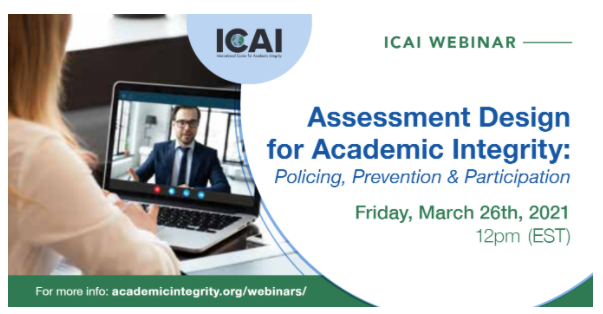
How to detect contract cheating
- Get to know your students
- Be familiar with student writing
- Look for discrepancies in references
- Use Turnitin
- Include a face-to-face component to discuss the details of their work:
- e.g., how the student undertook the work or how the student chose references
- See if the student understands both the assignment and the content of the work submitted
Raising faculty awareness
- Ensure the program team is on the same page
- Have conversations around academic integrity as a team
- Share examples to help with understanding
- Collectively support academic honesty
- Include a syllabus statement like the following
- In circumstances where there is a concern about a breach of academic integrity, faculty may request an initial meeting to discuss these concerns with the student
Resources
References
Better Business Bureau. (2021, April 2). BBB Scam Alert: Cheating on homework leads to extortion scam. https://www.bbb.org/article/news-releases/24032-bbb-scam-alert-students-hire-homework-help-and-end-up-in-extortion-con.
Eaton, S. E. (2021, June 22). Contract Cheating in Canada: How it Started and How it’s Going. Paper presented at the Canadian Symposium on Academic Integrity (CSAI) 2021 (Online), Thompson Rivers University, Kamloops, BC, Canada. http://hdl.handle.net/1880/113525.
Grue, D., Eaton, S. E., & Boisvert, S. (2021). Parallels Between the Contract Cheating Industry and Organized Crime. http://hdl.handle.net/1880/113323.
Professional development opportunities
The Manitoba Academic Integrity Network (MAIN) hosts a series of six professional development opportunities related to academic integrity. Registration links are found on the MAIN Speaker Series website. Please email seelandjl@assiniboine.net with any further questions.
A certificate of completion (PDF) will be emailed to those who complete all six sessions in this series.
The International Center for Academic Integrity (ICAI) is an organization that was created to combat cheating, plagiarism, and academic dishonesty in higher education. ICAI offers assessment services, resources and consultations to its member institutions. They are offering a series of accessible webinars on a variety of topics related to academic integrity. For more information, please contact us.
Podcasts and additional resources
ACIFA position paper on academic integrity
Alberta Colleges and Institutes Faculties Association (ACIFA) – Position paper first of its kind in the world. It provides an excellent summary of the challenges of promoting academic integrity and faculty’s role in the process, including the discussion of:
- academic integrity and workload
- emotional labour and burnout
- institutional policies and practices
- curriculum and assessment practices
- text-matching software and other technology solutions
- academic file-sharing and copyright
- contract cheating
- artificial intelligence
- equity, diversity and inclusion
- decolonization, Indigenization and recommendations
The Score podcast
The Score podcast explores issues of academic integrity.
Teaching in Higher Ed podcasts
Episode 19: Cheating Lessons
Catching a student cheating can evoke all sorts of feelings, such as frustration, disappointment, anger or ambivalence.
In episode 19 of Teaching in Higher Ed, Dr. James M. Lang talks about lessons learned from cheating.
Episode 157: Promoting Academic Integrity
Phil Newton talks about promoting academic integrity on episode 157 of the Teaching in Higher Ed podcast.
References
Hughes, C, and McCabe, D.(2006) Academic misconduct within higher education in Canada. Journal of Higher Education. 36(2): 1-21.
Lang, J. (2015, May 4). Cheating Inadvertently. The Chronicle of Higher Education: Advice. Retrieved from https://www.chronicle.com/article/cheating-inadvertently/
Miron, J., & Fenning, K. (2018). Academic integrity pledges—Acculturating students to integrity within Canadian higher education. Canadian Perspectives on Academic Integrity, 1(2), 46-57. DOI: https://doi.org/10.11575/cpai.v1i2.56983
Mundy, T., Murray, K., Tubridy, K., & Littrich, J. (2020). The role of a law student pledge in shaping positive professional ethical identities: A case study from Australia. International Journal of the Legal Profession. https://doi.org/10.1080/09695958.2020.1749638
Robinson, J. A., & Glanzer, P. L. (2017). Building a culture of academic integrity: What students perceive and need. College Student Journal, 51(2), 209.
